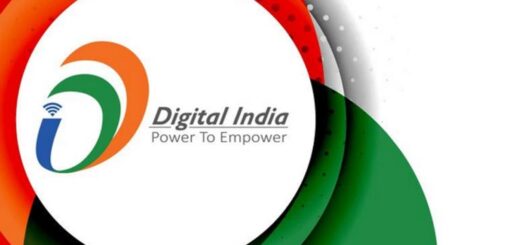Government Schemes – AYUSH – Power – Chemical
by
Mentors4ias
·
March 28, 2019
National Ayush Mission
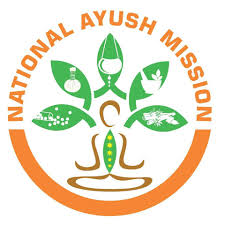
- The Ministry of AYUSH was formed on 9th November 2014 to ensure the optimal development and propagation of AYUSH systems of health care. Earlier it was known as the Department of Indian System of Medicine and Homeopathy (ISM&H) which was created in March 1995 and renamed as Department of Ayurveda, Yoga and Naturopathy, Unani, Siddha and Homoeopathy (AYUSH) in November 2003, with focused attention for development of Education and Research in Ayurveda, Yoga and Naturopathy, Unani, Siddha and Homoeopathy.
- The basic objective of NAM is to promote AYUSH medical systems through cost effective AYUSH services, strengthening of educational systems, facilitate the enforcement of quality control of Ayurveda, Siddha and Unani & Homoeopathy (ASU &H) drugs and sustainable availability of ASU & H raw-materials.
Objectives include
- To provide cost effective AYUSH Services, with a universal access through upgrading AYUSH Hospitals and Dispensaries, co-location of AYUSH facilities at Primary Health Centres (PHCs), Community Health Centres (CHCs) and District Hospitals (DHs).
- To strengthen institutional capacity at the state level through upgrading AYUSH educational institutions, State Govt. ASU&H Pharmacies, Drug Testing Laboratories and ASU & H enforcement mechanism.
- Support cultivation of medicinal plants by adopting Good Agricultural Practices (GAPs) so as to provide sustained supply of quality raw-materials and support certification mechanism for quality standards, Good Agricultural/Collection/Storage Practices.
- Support setting up of clusters through convergence of cultivation, warehousing, value addition and marketing and development of infrastructure for entrepreneurs.
The National AYUSH Mission (NAM) makes provision for the following:-
- Co-location of AYUSH facilities at Primary Health Centers (PHCs), Community Health Centers (CHCs) and District Hospitals (DHs).
- Up gradation of exclusive State Government AYUSH Hospitals and Dispensaries
- Setting up of up to 50 bedded integrated AYUSH Hospital.
- Upgradation of State Government Educational Institutions.
- Setting up of new State Government AYUSH Educational Institutions in the State where it is not available
- Strengthening of State Government/ Public Sector Undertaking (PSU) Ayurveda, Siddha, Unani and Homoeopathy (ASU&H) Pharmacies and Drug Testing Laboratories (DTL).
- Cultivation and Promotion of Medicinal Plants.
Department of Pharmaceuticals, Ministry of Chemicals and Fertilizers
Jan Aushadhi Scheme
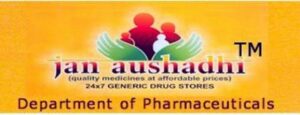
- The Jan Aushadhi Scheme (Public Medicine Scheme) is a direct market intervention scheme launched by the Department of Pharmaceuticals, Ministry of Chemicals and Fertilizers, Govt. of India, to make available quality generic medicines at affordable prices to all citizens through a special outlet known as Jan Aushadhi Store (JAS) opened in each district of the States.
- PMBJP stores have been set up to provide generic drugs, which are available at lesser prices but are equivalent in quality and efficacy as expensive branded drugs. It was launched by the Department of Pharmaceuticals in November 2008 under the name Jan Aushadi Campaign. Bureau of Pharma PSUs of India (BPPI) is the implementation agency for PMBJP.
- Bureau of Pharma PSUs of India (BPPI) is the implementation agency.
- JAS can be opened and operated by any NGO/Institution/Co-operative Society identified by State Governments on the free space provided in the premises of Government Hospital by the State Governments.
- Further,any NGO/Society/Trust/Institution/Self Help Group having experience of operation in welfare activities for 3 years and having space and financial capacity or any individual including un-employed pharmacist / medical practitioner having space and financial capacity can open a JAS store.
‘Pharma Jan Samadhan’ scheme
- ‘Pharma Jan Samadhan’ scheme is a web enabled system for redressal of consumers’ grievances relating to pricing and availability of medicines, created by National Pharmaceutical Pricing Authority (NPPA).
- It would serve as a robust e-governance tool for protection of consumers’ interests through effective implementation of the Drugs (Price Control) Order 2013.
- ‘Pharma Jan Samadhan’ will provide consumers and others with an on-line facility to redress their complaints relating to over-pricing of medicines, non-availability or shortage of medicines, sale of new medicines without prior price approval of NPPA, and refusal of supply for sale of any medicine without good and sufficient reason. NPPA will initiate action on any complaint within 48 hrs of its receipt.
Ministry of Power
Unnat Jyoti by Affordable LEDs for All.
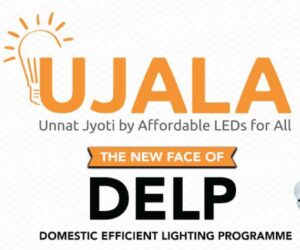
- The scheme is being implemented by Energy Efficiency Services Limited (EESL), a joint venture of PSUs under the Union Ministry of Power.
- It is LED based Domestic Efficient Lighting Programme (DELP).
- Under it, LED Bulbs are distributed.
- It wants every home in India to use LED bulbs so that the net power or energy consumption rate comes down and the carbon emission rates can also be checked
- The scheme will not only help reduce consumers their electricity bills but also contribute to the energy security of India.
- The scheme is being monitored in a transparent manner through a national dashboard (delp.in).
- Every grid-connected consumer having a metered connection from their respective Electricity Distribution Company can get the LED bulbs at about 40% of the market price under the UJALA Scheme. Consumers also have the option of paying for the LEDs in equated monthly instalments.
Deen Dayal Upadhyay Jyoti scheme
- The Government of India has launched the scheme “Deendayal Upadhyaya Gram Jyoti Yojana” for rural electrification. The erstwhile Rajiv Gandhi Grameen Vidyutikaran Yojana (RGGVY) scheme for village electrification and providing electricity distribution infrastructure in the rural areas has been subsumed in the DDUGJY scheme. Rural Electrification Corporation is the Nodal Agency for implementation of DDUGJY.
The Yojana also includes the components:
- To separate agriculture and non agriculture feeders facilitating judicious rostering of supply to agricultural and non-agricultural consumers in rural areas and
- Strengthening and augmentation of sub transmission and distribution infrastructure in rural areas, including metering of distribution transformers/feeders/consumers.
Pradhan Mantri Sahaj Bijli Har Ghar Yojana – ‘Saubhagya’
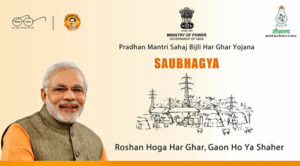
- Pradhan Mantri Sahaj Bijli Har Ghar Yojana – ‘Saubhagya’ was launched in September, 2017.
- Under Saubhagya free electricity connections to all households (both APL and poor families) in rural areas and poor families in urban areas will be provided.
- Rural Electrification Corporation (REC) has been designated as nodal agency for the Saubhagya scheme.
- The scheme aims to achieve universal household electrification in all parts of the country.
- All DISCOMs including Private Sector DISCOMs, State Power Departments and RE Cooperative Societies shall be eligible for financial assistance under the scheme in line with Deen Dayal Upadhyaya Gram Jyoti Yojana (DDUGJY).
- Eligibility: The prospective beneficiary households for free electricity connections under the scheme would be identified using SECC 2011 data.
- However, un-electrified households not covered under SECC data would also be provided electricity connections under the scheme on payment of Rs. 500 which shall be recovered by DISCOMs in 10 instalments through electricity bill.
- The scheme also includes objective of Providing Solar Photovoltaic (SPV) based standalone system for un-electrified households located in remote and inaccessible villages / habitations, where grid extension is not feasible or cost effective.
Integrated Power Development Scheme
- It envisages strengthening of sub-transmission network, Metering, IT application, Customer Care Services, provisioning of solar panels and the completion of the ongoing works of Restructured Accelerated Power Development and completion of the Reforms Programme (RAPDRP).
- The scheme will help in reduction in AT&C losses, establishment of IT enabled energy accounting / auditing system, improvement in billed energy based on metered consumption and improvement in collection efficiency
- All Discoms including private Discoms and State Power Departments will be eligible for financial assistance under this scheme.
Ujjwal DISCOM Assurance Yojana (UDAY)
- Ujjwal DISCOM Assurance Yojana (UDAY) is the financial turnaround and revival package for electricity distribution companies of India (DISCOMs) initiated by the Government of India with the intent to find a permanent solution to the financial mess that the power distribution is in.
- It allows state governments, which own the DISCOMs, to take over 75 percent of their debt as of September 30, 2015, and pay back lenders by selling bonds. DISCOMs are expected to issue bonds for the remaining 25 percent of their debt.
- Till now 32 states/UT have joined this scheme.
Street Light National Programme
- Street Light National Programme is an initiative of the Government to promote energy efficiency in the country. Government aims to replace 3.5 crore conventional street lights with energy efficient LED lights. This would result in annual energy saving of 900 crore units and the total cost savings of municipalities every year will be Rs 5,500 crore.
- Energy Efficiency Services Limited, a Public Energy Services Company under the administration of Ministry of Power, Government of India (GoI) is the implementing agency for SLNP.
Ministry of Petroleum and Natural Gas
Direct Benefit Transfer of LPG (DBTL) Scheme
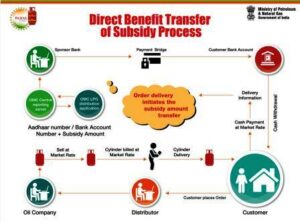
- The Direct Benefit Transfer of LPG (DBTL) or PAHAL (Pratyaksh Hanstantrit Labh) scheme was earlier launched in 2013 and finally covered 291 districts.
- It required the consumer to mandatorily have an Aadhaar number for availing LPG Subsidy.
- If LPG consumer does not have an Aadhaar number, then he can directly receive subsidy in his bank account without the use of Aadhaar number. This option which has now been introduced in the modified scheme ensures that LPG subsidy is not denied to an LPG consumer on account of lack of Aadhaar number.
Pradhan Mantri Ujjwala Yojana
- Under the scheme, five crore LPG connections are to be provided to BPL households. The identification of eligible BPL families will be made in consultation with the State Governments and the Union Territories.
- BPL is a person/ household who suffer from at least one deprivation under the Socio-Economic Caste census (SECC) – 2011 Database.
- While the selection of beneficiaries would be from the BPL families only, preference would be given to SC/ST and weaker sections of society. While providing the new connections to BPL households, priority would be given to the States which have lower LPG coverage (compared to the national average) as on 1st Jan, 2016.
- Release of LPG connection under this Scheme shall be in the name of the women belonging to the BPL family.
- The Government has also decided to cover the following categories under the Scheme :-
- All SC/STs households beneficiaries of Pradhan Mantri Awas Yojana(PMAY) (Gramin)
- Antyoday Anna Yojana (AAY)
- Forest dwellers
- Most Backward Classes (MBC)
- Tea & Ex-Tea Garden Tribes
- People residing in Islands
- People residing in river islands.
- Cabinet approves expansion of beneficiaries list under Pradhan Mantri Ujjwala Yojana
- The Cabinet Committee on Economic Affairs (CCEA) during December 2018 has cleared the proposal of Ministry of Petroleum & Natural Gas to release deposit free LPG connections to poor families, who have not been considered earlier for release of LPG connections under Pradhan Mantri Ujjwala Yojana (PMUY) on account of their names not been covered either in Socio-Economic Caste Census (SECC) list or the seven identified categories.





Tags: iasIpsstudy materialsupsc
You may also like...








